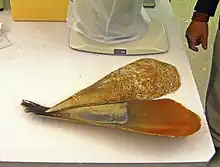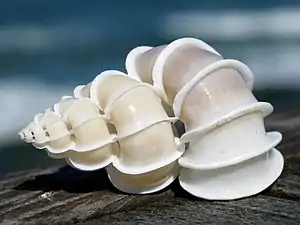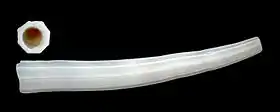Jewett Sand Formation
The Jewett Sand Formation is a geologic formation in California, USA. It preserves fossils dating back to the Miocene Epoch of the Neogene period.
| Jewett Sand Formation | |
|---|---|
| Stratigraphic range: Neogene: Miocene | |
| Type | Formation |
| Location | |
| Region | California |
| Country | United States |
Vertebrates
Sharks
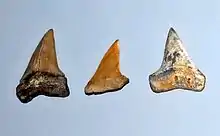
Fossil teeth of C. hastalis
- †Alopias exigua[1]
- †Alopias latidens[1]
- Alopias vulpinus'[1]
- †Carcharocles angustidens '[1]
- †Carcharodon hastalis'[1]
- Carcharhinus sp.'[1]
- Cephaloscyllium sp.'[1]
- Cetorhinus sp.'[1]
- Echinorhinus blakei'[1]
- †Galeocerdo medius'[1]
- †Galeorhinus latus'[1]
- Heterodontus sp.[1]
- Hexanchus sp.[1]
- †Megachasma applegatei [2]
- †Megalolamna paradoxodon[3]
- †Negaprion elongata'[1]
- Odontaspis ferox'[1]
- †Parotodus benedini'[1]
- Sphyrna sp.'[1]
- †Squalus serriculus'[1]
- Squatina lerichi'[1]
Rays and skates
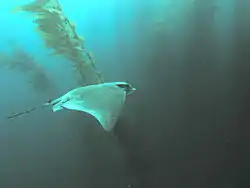
Bat ray in kelp forest, San Clemente Island.
Bony Fishes
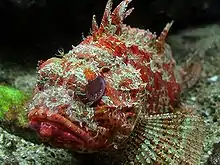
A modern Scorpaenid fish.
- Bothidae indet.[1]
- Embiotocidae indet.[1]
- Gadidae indet.[1]
- Pleuronectidae indet.[1]
- Sciaenidae indet.[1]
- Scorpaenidae indet.[1]
Reptiles
- Chelonia indet.[1]
- Crocodylia indet.[1]
- †Psephophorus calvertensis[1]
Birds
Mammals
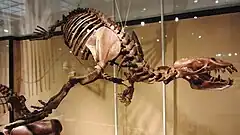
- †Allodesmus kernensis[4]
- †Allodelphis pratti[4]
- †Anchitherium sp.[1]
- †Argyrocetus joaquinensis[4]
- †Argyrocetus bakersfieldensis[4]
- †Desmathyus[1]
- †Enaliarctidae indet.[1]
- †Enaliarctos mealsi[1]
- †Macrodelphinus kelloggi[4]
- †Miodelphis californicus[4]
- Otariidae indet.[4]
- Phocidae indet.[4]
- Pinnipedia indet.[1]
- †Pinnarctidion bishopi
- †Squalodontidae indet.[1]
Invertebrates
Bivalves
- Aequipecten andersoni [1]
- Arca montareyanna[1]
- Chione temblorensis[1]
- Clementia pertenuis[1]
- Crassostrea titan[1]
- Crenomytilus mathewsoni[1]
- Cytheria matthewsoni[1]
- Dosinia conradi[1]
- Dosinia whitneyi[1]
- Glycymeris septentrionalis[1]
- Homomya sp.[1]
- Mactromeris albaria[1]
- Mytilus sp.[1]
- Nodipecten estrellanus[1]
- Pecten bowersi[1]
- Pecten magnolia[1]
- Pecten nevadaensis[1]
- Pecten perrini[1]
- Pecten sespeensis[1]
- Pectunculus branneri[1]
- Phacoides actulineatus[1]
- Pinna alamedaensis[1]
- Pycnodonte eldridgei[1]
- Solen sp.[1]
- Tellina ocoyana[1]
- Tellina sp.[1]
- Trachycardium vaquerosensis[1]
Gastropods
- Agasoma gravidum[1]
- Agasoma kerrianum[1]
- Conus oweni[1]
- Crepidula princeps[1]
- Epitonium rugiferum[1]
- Natica lewisi[1]
- Neverita callosa[1]
- Purpura lima[1]
References
- F. M. Anderson. 1911. The Neocene deposits of Kern River, California, and the Temblor Basin. Proceedings of the California Academy of Sciences. 3:73-148
- K. Shimada, B. J. Welton, and D. J. Long. 2014. A new fossil megamouth shark (Lamniformes, Megachasmidae) from the Oligocene-Miocene of the western United States. Journal of Vertebrate Paleontology. 34(2):281-290
- Shimada, K.; Chandler, R. E.; Lam, O. L. T.; Tanaka, T.; Ward, D. J. (2016-10-03). "A new elusive otodontid shark (Lamniformes: Otodontidae) from the lower Miocene, and comments on the taxonomy of otodontid genera, including the 'megatoothed' clade". Historical Biology. 29 (5): 704–714. doi:10.1080/08912963.2016.1236795. ISSN 0891-2963.
- L. E. Wilson. 1935. Miocene marine mammals from the Bakersfield region, California. The Peabody Museum of Natural History Bulletin. 4:1-143
- Various Contributors to the Paleobiology Database. "Fossilworks: Gateway to the Paleobiology Database". Retrieved 17 December 2021.
This article is issued from Wikipedia. The text is licensed under Creative Commons - Attribution - Sharealike. Additional terms may apply for the media files.
